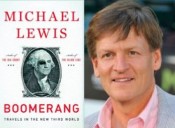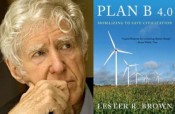DISRUPTIVE: BIO-INSPIRED ROBOTICS features three separate interviews with (1) RADHIKA NAGPAL, (2) ROBERT WOOD, and (3) CONOR WALSH
Written on October 15th, 2015Welcome to the second episode of my new monthly podcast series produced with Harvard’s Wyss Institute for Biologically Inspired Engineering.
DISRUPTIVE: BIO-INSPIRED ROBOTICS features three separate interviews with (1) RADHIKA NAGPAL, (2) ROBERT WOOD, and (3) CONOR WALSH. From insects in your backyard, to creatures in the sea, to what you see in the mirror, engineers and scientists at Wyss are drawing inspiration to design a whole new class of smart robotic devices
In this one, CONOR WALSH discusses how a wearable robotic exosuit or soft robotic glove can assist people with mobility impairments, as well as how the goal to create real-world applications drives his research approach.
In part one, RADHIKA NAGPAL talks about her work Inspired by social insects and multicellular systems, including the TERMES robots for collective construction of 3D structures, and the KILOBOT thousand-robot swarm. She also speaks candidly about the challenges faced by women in the engineering and computer science fields.
In part two, ROBERT WOOD discusses new manufacturing techniques that are enabling popup and soft robots. His team’s ROBO-BEE is the first insect-sized winged robot to demonstrate controlled flight.
The mission of the Wyss Institute is to: Transform healthcare, industry, and the environment by emulating the way nature builds, with a focus on technology development and its translation into products and therapies that will have an impact on the world in which we live. Their work is disruptive not only in terms of science but also in how they stretch the usual boundaries of academia.
http://wyss.harvard.edu/
– See more at:
DISRUPTIVE: BIO-INSPIRED ROBOTICS Radhika Nagpal Interview
DISRUPTIVE: BIO-INSPIRED ROBOTICS Robert Wood Interview
Conor Walsh’s interview transcript
http://aworldthatjustmightwork.com/2015/07/auto-draft-18/
DISRUPTIVE: BIO-INSPIRED ROBOTICS features three separate interviews with (1) RADHIKA NAGPAL, (2) ROBERT WOOD, and (3) CONOR WALSH
Written on October 7th, 2015
Welcome to the second episode of my new monthly podcast series produced with Harvard’s Wyss Institute for Biologically Inspired Engineering.
DISRUPTIVE: BIO-INSPIRED ROBOTICS features three separate interviews with (1) RADHIKA NAGPAL, (2) ROBERT WOOD, and (3) CONOR WALSH. From insects in your backyard, to creatures in the sea, to what you see in the mirror, engineers and scientists at Wyss are drawing inspiration to design a whole new class of smart robotic devices
In this one, ROBERT WOOD discusses new manufacturing techniques that are enabling popup and soft robots. His team’s ROBO-BEE is the first insect-sized winged robot to demonstrate controlled flight.
In part one, RADHIKA NAGPAL talks about her work Inspired by social insects and multicellular systems, including the TERMES robots for collective construction of 3D structures, and the KILOBOT thousand-robot swarm. She also speaks candidly about the challenges faced by women in the engineering and computer science fields.
In part three, CONOR WALSH discusses how a wearable robotic exosuit or soft robotic glove could assist people with mobility impairments, as well as how the goal to create real-world applications drives his research approach.
The mission of the Wyss Institute is to: Transform healthcare, industry, and the environment by emulating the way nature builds, with a focus on technology development and its translation into products and therapies that will have an impact on the world in which we live. Their work is disruptive not only in terms of science but also in how they stretch the usual boundaries of academia.
http://wyss.harvard.edu/
– See more at:
DISRUPTIVE: BIO-INSPIRED ROBOTICS Radhika Nagpal Interview
DISRUPTIVE: BIO-INSPIRED ROBOTICS Conor Walsh Interview
Robert Wood’s interview transcript
Free Forum Q&A – TINA ROSENBERG: Fixes column at nytimes.com JOIN THE CLUB How Peer Pressure Can Transform the World
Written on July 24th, 2015
Originally aired July 2011
If you want to change people’s behavior – get them to use condoms, stop smoking, eat more healthy foods, for example – how do you do it? Though the examples may be contemporary, the question is old as society itself. What have we tried? Carrots – gold stars, awards, recognition, money, religious rewards…And sticks – guilt, shame, ostracism, punishment – both on earth and in the hereafter. So what works?
In her book JOIN THE CLUB, TINA ROSENBERG identifies a successful strategy based on harnessing the positive force of peer pressure. She tells stories of how it has reduced AIDS among teens in South Africa and smoking among teens in the United States, made villages in India healthier and more prosperous, helped minority students get top grades in college calculus, and even led to the fall of Slobodan Milosevic. Creative social entrepreneurs are starting to use peer pressure to accomplish goals as personal as losing weight and as global as fighting terrorism.
If you’re committed to changing behavior – from your own diet or habits to societal responses to climate change or inequity – join the club.
http://opinionator.blogs.nytimes.com/author/tina-rosenberg/?_r=0
Free Forum Q&A – MICHAEL LEWIS MONEYBALL; THE BIG SHORT; THE BLIND SIDE BOOMERANG: Travels in the New Third World includes a profile of Greece post-global crash
Written on July 16th, 2015
Originally aired October 2011
As the two countries play a high stakes game of chicken, it’s a good time to see what Greece and Germany looked like in the aftermath of the global crash. Who better to be our tour guide than best-selling author MICHAEL LEWIS?
Lewis’s book, BOOMERANG: Travels in the New Third World is made up of articles originally published in Vanity Fair and picks up where 2010’s THE BIG SHORT left off. Governments are the focus of this book. Mostly because they have taken on the bad debts of the too-big-to-fail banks, so now they are themselves at risk. Now politics and culture become much more important as to how they will deal with that risk. The book also profiles Ireland, Iceland, and California.
Both Ira Glass and Malcolm Gladwell say today’s guest is their favorite storyteller. In his books and magazine articles, Lewis writes about sports, business, Wall Street, Silicon Valley, political campaigns, fatherhood. Stuff that matters to a lot of people. He’s smart and he has a sense of humor. Once a trader at Salomon Brothers, he wrote his first best-seller, LIAR’S POKER about the excesses of Wall Street during the 1980s. He continues to write about that world with his last two books, a column for Bloomberg, and articles in Vanity Fair. We also talk about the twisted path taken to get MONEYBALL into movie theatres.
Free Forum Q&A – LESTER BROWN, Founder of Worldwatch and Earth Policy Institute author of PLAN B 4.0: Mobilizing to Save Civilization
Written on July 9th, 2015
Originally Aired October 2009
We are in a race between tipping points in natural and political systems.
Which will come first? Can we mobilize the political will to phase out coal-fired power plants before the melting of the Greenland ice sheet becomes irreversible? Can we halt deforestation in the Amazon basin before the forest becomes vulnerable to fire and is destroyed? Can we cut carbon emissions fast enough to save the Himalayan glaciers that feed the major rivers of Asia? Can we win this race?
LESTER BROWN thinks we can…
In his book, PLAN B 4.0: MOBILIZING TO SAVE CIVILIZATION, BROWN lays out the symptoms, the diagnosis, and the cure. He estimates that we could solve all the world’s greatest problems for $200B a year – less than half the US defense budget.
PLAN B 4.0 is a comprehensive plan for reversing the trends that are undermining our future. Its four overriding goals are to stabilize climate, stabilize population, eradicate poverty, and restore the earth’s damaged ecosystems. Failure to reach any one of these goals will likely mean failure to reach the others as well.It’s time for Plan B: an all-out response at wartime speed proportionate to the magnitude of the threats facing civilization.
http://www.earth-policy.org/about_epi/C32





